STEAM INHALATION (Hot Application) – Purpose, Preliminary Assessment, Preparation of Patient and Environment, Equipment, Procedure and After Care

Inhalation
is defined as the drawing of air or other vapors into lungs through mouth or
nose.

Steam
inhalation is defined as utilization of moist heat to loosen lung congestion
and help liquify secretions
Purpose

- To relieve inflammation of the mucus membrane
in acute colds and in sinusitis - To relieve irritation in bronchitis
and whooping cough by moistening - To provide antiseptic action on the
respiratory tract - To provide warm and moist air
following operation, e.g. tracheotomy - To soften thick, tenacious mucus and
relieve coughing
Types of Inhalations
- Dry-Inhalation: ether, chloroform,
nitrous oxide, menthol, eucalyptus and spirit ammonia - Water moist inhalation: plain steam,
tincture benzoic, menthol in alcohol and oil of eucalyptus solution
Indication of Tincture Benzoin Inhalation
- Purulent bronchitis
- Bronchiectasis
- Lung abscess
- Common cold and sore throat
General Instructions
- The temperature of the water should
be remaining between 120 and 160 degree F or 54.4 and 76.7 degree Celcius - Water in the inhaler should remain
just below the spout to avoid scalding - The spout of the inhaler must be
placed in such a way that the patient cannot touch it or put his face too near - Keep the patient warm and prevent
drought before, during and after the inhalation - When volatile groups like menthols
are used to keep his eyes closed to prevent the drug irritating the conjunctiva - Observe the patient closely
throughout the procedure
Preliminary Assessment
Check
- The doctors order for any specific
instructions - General condition and diagnosis of
the patient - Self-care ability to follow
instructions - Type, duration and medication of
inhalation - Articles available in the unit
Preparation of the Patient and Environment
- Explain the procedure to the patient
- Allow the patient to empty to the
bladder and towels if necessary. Given bedpan or urinal to a bedridden patient - Provide Fowler’s position with back
rest, cardiac table and extra pillows - Close windows, doors and put off fan
to prevent drought - Provide sputum cup within the reach
of the patient - Provide a face towel to remove sweat
from face during inhalation - Mouth piece should be boiled and
cooled before use - Arrange the articles at the bedside
Equipment
A tray
containing:
- Nelson’s inhaler in a large bowel
- Face towel and patient towel – 1
- Bath blanket
- Tincture benzoin
- Teaspoon, dropper
- Kettle with boiling water
- Gauze pieces
- Cotton swabs
- Swab sticks
- Kidney tray and paper bag
Procedure
- Wash hands
- Open sterile inhaler mouth – piece
and cover with sterile gauze and attach to clean inhaler - Close spout of inhaler with cotton
ball. Pour boiling water up to spout. Add medicine (tincture benzoin) if
needed. Close inhaler with mouth piece and take to bed side - Face spout away from patient and
remove cotton ball - Instruct to take in deep breath
through mouth and breathe out through nose - Continue procedure for 15 to 20
minutes keep patient warm throughout to prevent chilling - Give chest physiotherapy and encourage
patient ot bring out sputum
After Care
- Remove the inhaler from the patient
- Use face towel to wipe of
perspiration from his face - Remove the accessories and make the
patient comfortable - Replace the articles after cleaning
- Wash hands
- Record the procedure in nurse’s
record sheet

NURSING PROCEDURES LIST CLICK HERE
Discover more from Bibliobazar Digi Books
Subscribe to get the latest posts sent to your email.




![First Aid (Quick Study Health) PDF Free Download [Direct Link]](https://bazarbiblio.com/wp-content/uploads/2024/02/First-Aid-Quick-Study-Health-PDF.jpg)